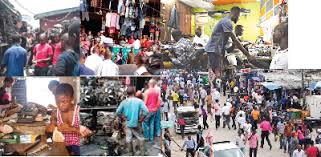
The Igbo industriousness is being threatened by the get-rich-quick syndrome among young men and women. This has led to the abandonment of the age long apprenticeship system. ONYEKACHI EZE says with the traction the system is gaining of recent, the Igbo society may regain its right place in human capital development.
The Igbo apprenticeship system, popularly known as Igba Boi, received a boost recently with the passage of the Igbo Apprenticeship Bill into law, by the Anambra State House of Assembly. This is a major step since the system gained traction in recent time, thanks to the research by an Igbo scholar, Prof. Ndubuisi Ekekwe.
Though Igba Boi, or apprenticeship is not entirely new in Igbo land, but the craze for quick money by emerging Igbo young men and women seems to overshadowing it. This craze, which is like cancer, has eaten deep into the fabric of Igbo society, such that those who would like to undergo mentorship training of any kind are regarded as lazy and lacking initiative.

Igbo apprenticeship system is an age long learning process aimed at transferring knowledge and empowering young people. It encompasses all training programmes, such as trading (commerce), skill acquisition such as carpentry, bricklaying, vehicle maintenance, furniture/upholstery making, television, refrigerator, or radio repair, hair dressing, tailoring, driving, vulcanising and other associated developmental businesses.
Before the advent of Western education Igba Boi, the apprenticeship system was major source of transferring knowledge and empowerment in Igbo land.
Prof. Ekekwe, founder and president of the African Institute of Technology whose work attracted global attention to Igbo apprenticeship system, gave a succinct explanation of what Igbo Igba Boi means, which he described as “the best business framework in the world.”
Says he in his work, which was adopted by Harvard Business Review (HBR) after passing through phases of editorial work, “A man goes into a business sector, and wins market share. Then, one day, he decides voluntarily to give out market share and immediately creates competitors for himself.
“And as he does that, he includes huge obligations to ensure those competitors thrive. So, magically, a system evolves where everyone is just doing well with no distorted imbalance.
“No one is super-rich but everyone is just fine! And the players just like it that way because ‘onye aghara nwanne ya’ (do not leave your brethren behind) is part of the culture!”
United Nations Development Programme (UNDP) said among Nigeria’s ethnic nationalities, the Igbo in South East Nigeria is the most balanced and economically stable part with the least hunger and economic stress on the citizens. This is attributed to the apprenticeship system, an equitable distribution of wealth.
Ogechi Adeola, a professor of Marketing at the Lagos Business School (LBS) in Pan-Atlantic University, also said the Igbo apprenticeship is the largest business incubator system in the world. At the 15th Inaugural Lecture of the institute in 2023, with the theme: “Decolonising Africa’s Business Practices: Pro-Indigenous Marketing Pathways To A Paradigm Shift”, Adeola, who is the Head of the Department of Marketing, Operations and Information Systems at the LBS, explained that the Igbo apprentices are groomed at a very young age to be great businessmen and women.
“The system has three major types namely, Igba-boi also known as Igba Odibo (become an apprentice);
Imu Oru also known as Imu Oruaka (learn a craft) and Imu Ahia (learn a trade).
“All types are geared towards the transfer of knowledge or entrepreneurial skills but they differ in approach.
“Unlike the Igba-boi/Igba Odibo where a mentee will be tutored for free for a period of pre-agreed years, in the Imu Oru/Imu Oruaka and Imu Ahia types, tutorship is paid for by the mentee or mentee’s parents/sponsors,” she explained.
This age long empowerment system is seriously being threatened by get rich quick syndrome among Igbo youths. Thus, the japa syndrome, Oke-ite, and yahoo yahoo are gaining traction among Igbo young men and women. These have not only disoriented the Igbo society, they have destroyed industriousness, innovation and sanctity of Igbo culture.
Though japa is a Nigerian problem, but it appears that Ndigbo are the most affected. This is not surprising. Ndigbo lead the pack in modern migration. It is estimated that no fewer than 10 million Igbos are in the diaspora, out of over 40 million of them that are found in the world. There is hardly any family in Igbo land that does not have a relation abroad. These people are not going on vacation, studies, or with the intention of coming back to the country. They have relocated.
Recently, one Eze Chukwudi Ihenetu, said he had acquired100 acres of land where he planned to build an Igbo village in Ghana. The village, according to him, will include road network, schools, hospitals and residential area. Back home in Nigeria, he is not known to have built a hut, and there are many other Ndigbo like him.
Japa leads to a loss of human capital. It not only depopulate the South East, it denies the region the services of her people, mostly youths. This leads in decline in skilled labor needed for local development and the overall loss of productive minds who could contribute to the region’s progress, making the destination countries the primary beneficiaries of this human capital flight.
On the flip side, however, Japa is advantageous, in the areas diaspora remittances, knowledge transfer, and skills development through international collaboration and the return of skilled individuals.
Annual remittance to Nigeria from diaspora is estimated at between $20 billion and $25 billion. Though the data to evaluate the actual amount that comes to Igbo land are not available, these funds go a long way in supporting local economy back home, in areas of education, local development, wealth creation, poverty reduction, real estate and improved quality of life.
The greatest effect of get-rich-quick syndrome is the bastardisation of Igbo culture by modern day traditional worshipers. Their concept of African Traditional Religion (ATR) is different from what our forefathers practiced.
Recently, Anambra State government declared war against native doctors in the state. The government outlawed the practice of these ‘doctors’ who it said, styled themselves Oke-ite and Ezenwayi, who allegedly used the art for the purpose of wealth accumulation through supernatural means.
They were accused of preparing charms for fake pastors, kidnappers and Yahoo Yahoo people, who commit all sort of crimes. Anambra State Homeland Security bill (2025) was passed into law, and assented to by Governor Chukwuma Soludo, to moderate the practice of African Traditional Religion in the state. The law imposes six years imprisonment or N20 million or both on defaulters upon conviction.
The new homeland law criminalises Oke-Ite and its variants like Ibubo, Awale, Udu Akomili, Aro Agbaka, etc.
Anambra State Commissioner of Information, Law Mefor, accused the native doctors and fake pastors of aiding the fight against insecurity in the state. Mefor said the fake native doctors prepare money potions for people who want wealth without work.
“There is also the one they call “Odeshi,” that is the ‘traditional bulletproof.’ The government has cause to believe it is also fraudulent because some of these native doctors deceiving our people would use blank bullets to test their work and not real bullets, and the people don’t know.
“Many of the kidnappers and killers killed or captured are found with the amulets and charms and yet get killed, whereas the charms are supposed to be bulletproof. So how come they get killed?
“You can see why many of these native doctors are in custody undergoing interrogations and investigations. The government can’t let them go before concluding investigations.
“Those against whom the government establishes prima facie cases will certainly be charged in court, while those without substantial cases against them will be set free. Certainly, the native doctors will have their days in court as prescribed by the law,” he assured.
Some native doctors have been taken into custody for suspected involvement in crime and criminality by the Anambra State government.
Levi Onyeka Obu, popularly known as ‘Ichie Billion’, ‘Ezeani’ and E dey play, e dey show,’ is presently standing trial for alleged kidnap, murder and ritual killings. Obu who hails from Umuojor village, Isiagu Community in Ezeagu local government area of Enugu State, was arrested by Nigeria Immigration Officer, Ugochukwu Orji at Seme border, in connection with attempted kidnap of 13 year-old girl.
The Igbo Apprenticeship Act, which has been signed into law by Governor Soludo, gives official recognition and regulation to the long-standing Igbo business mentorship system. The legislation took effect on September 10, 2025, is expected to boost entrepreneurship, create employment opportunities and enhance economic development across the state.
Sir Ejike Okechukwu, who sponsored the bill, said it provides a legal framework to guide the apprenticeship system, ensuring that apprentices receive fair treatment while establishing minimum standards for training. It also defines the rights and responsibilities of both mentors and apprentices to promote fairness, accountability and mutual respect. Under the new law, every apprentice is required to have basic education before l enrolling; the training period must not exceed seven years.
A major highlight of the legislation is the creation of the Anambra State Igbo Apprenticeship Commission, a regulatory body that will be responsible for registering apprentices, overseeing training activities and resolving disputes between mentors and trainees. According to Okechukwu, this provision is designed to modernise the Igba Boi system while preserving its cultural essence and economic significance.
In a world where the rich are getting richer, the poor are getting poorer, and the margin of economic inequality getting wider every day, the IAS is the best system to address the growing inequality.
IAS is an age long empowerment system. It is used to address the problem of inequality between the rich and the poor, and thus ensures economic stability.
As Ekekwe asserted, under the Igbo apprenticeship system, “you attain easily an efficient economic equilibrium where inequality is severely mitigated.”
The Igba Boi system, which has sustained the Igbo entrepreneurial spirit for generations, is widely regarded as one of Africa’s most successful models for youth empowerment and wealth creation. With its formal recognition by law, Anambra State has positioned itself as a pioneer in institutionalising an indigenous practice that has transformed countless lives, while also setting an example that other states in South East may soon follow.
Dr. Rose Umejiaku, a lecturer in the Faculty of Law, Nnamdi Azikiwe University, Awka, said the Igbo Apprenticeship system, which though not formal, has proven to be not only a sure way of lifting people out of poverty, but a recognised means of wealth creation. Her suggestion is for the government take steps to formally recognise this model, amend the law to accommodate it and setup an agency to oversee the operations. Happily the Anambra State government has taken initiative in this direction.
The apprenticeship system should not and cannot be a substitute to formal education. Rather the blend of the two be encouraged. Founder of United Nigeria Airline, Obiora Okonkwo, has already endowed a chair at Nnamdi Azikiwe University, Awka, for the study the Igbo Apprenticeship System and its role in wealth creation. The aims of this initiative are to formalise “the skills learned in the traditional Oga-Nwaboi (Master-Apprentice) system and bridge the gap between formal education and practical, entrepreneurial training.”
Now that the Igbo Apprenticeship System has gained international recognition, thanks to Prof. Ekekwe’s research, it should be made a course of study in our universities especially in the South East. State governments in the zone should equally create a pool of funds where graduates could draw repayable funds to establish their businesses upon graduation. This way, the craze for quick and unaccountable wealth among Igbo youths could be tackled and nip in the bud.




